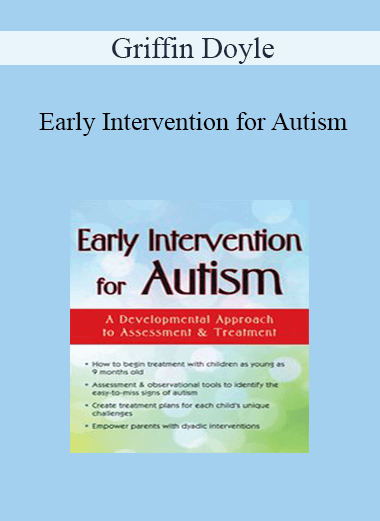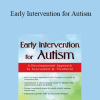Griffin Doyle – Early Intervention for Autism: A Developmental Approach to Assessment & Treatment
$219.99 Original price was: $219.99.$43.00Current price is: $43.00.
[Instant Download] – You will receive instant download access after the purchase
- Faculty:
- Griffin Doyle
- Duration:
- 6 Hours 48 Minutes
- Format:
- Audio and Video
- Copyright:
- Dec 04, 2018
Description
| Manual – Early Intervention for Autism (3.26 MB) | 44 Pages | Available after Purchase | |
| Instructions for ASHA Credit- SELF STUDY ONLY – 12/04/18 (0.03 MB) | Available after Purchase |
Outline
The Developmental Perspective
- Core functional emotional capacities: Case examples
- Inherited neurobiology and human experience
- Infant/Child seeking security, information, meaning
- Role of the parent-child bond
- All developmental domains are interdependent
- What typical traits are missing in ASD-like behavior?
Assessment and Easy-To-Miss “Red Flags”
- Earliest atypical infant behavior
- DSM-5® criteria
- Formal evaluations
- Your play/activity with child
- Informal and qualitative traits
- Parent-Child (P-C) Interaction
- Differentiating SID or Expressive-Receptive LD from ASD
- Current research findings
Developmental Evaluation
- Rate six core functional stages
- Regulation and shared attention
- Warm engagement
- Intention and purposeful, reciprocal interaction
- Continuous interaction and problem-solving
- Symbolic play and language
- Representational thinking
- Level of communication and play/activity
- Quality of P-C emotional bond
- Joint Attention (JA) and Imitation
- Atypical Sensory-Motor Systems
- Patterns and triggers for ASD-like behavior
INTERVENTION STRATEGIES AND TECHNIQUES
Encourage Shared Play and Pleasure
- Establish and hold mutual engagement
- Track child’s interests at his/her functional level
- Follow child’s back-and-forth pace
- Find Fun!! Go for the “Gleam” and eye contact
- Gently join self-absorbing action
- Invite/model further exploration
- Inject needed “affect”
- Reciprocity/communication
- Intentionality
- Rigidity/transitions
Treat Difficult Behaviors
- Dysregulation, security seeking
- Meltdowns
- Seeking/avoiding
- Stimming/self-absorbed
- Perseveration
- Physical proximity/holding
- Eating/sleeping problems
Major Treatment Approaches
- Relationship-based, ABA, mixed programs
- Application of Developmental (DIR) Model
- Dyadic treatment approach
Developmental Treatment Framework
- Create a treatment plan in class: Class example
- Follow developmental evaluation
- Prepare suitable sensory-motor environment
- Shoot for child succeeding at his developmental level
- Follow and join child’s interests
Empower Parents and Families
- Help them come to terms with the ASD diagnosis
- Strategies for grief, stress, anxiety and depression
- Strengthen/coach the parent-child relationship: Case example
- Understand their child’s behavior and motives
- Team work/referral process
- Coordination with school placement
Faculty
Griffin Doyle, Ph.D Related seminars and products: 1
Griffin Doyle, Ph.D., is a licensed clinical psychologist with over 43 years of experience practicing psychoanalytic and developmentally-based psychotherapy with children and adults in private practice. Dr. Doyle has over 30 years of experience assessing and treating infants, toddlers and pre-school children “at-risk-for” or diagnosed with Autism Spectrum Disorder (ASD). He primarily works in a parent-mediated, developmentally-oriented treatment model popularly known as DIR/Floortime ©. This is a multi-dimensional framework that weaves together cognitive, social-emotional, relational, and innate constitutional factors as they interact uniquely in each child.
Dr. Doyle has worked and collaborated with a variety of specialists and reviewed studies aiming to capture the earliest signs and effective treatments for the youngest portion of the ASD population. He consistently lectures, trains and consults on “red flags”, subtle diagnostic cases, and the variability of symptom formation during early development (0-5 years). Dr. Doyle has found being face-to-face with each unique child and his/her caregiver provides a critical, compelling means to witness the child’s interests, communication style and capacity to engage. He coordinates ASD intervention with a team of occupational therapists, speech therapists, educators and pediatricians for the best possible outcomes. He often serves not only as a team member, but also as a case manager coordinating care to construct, execute, and refine treatment strategies.
Dr. Doyle has served as a core faculty member of various post-graduate training organizations. He is a co-founder, senior faculty, and training coordinator for the Profectum Foundation Training Programs. In this capacity, he teaches, mentors, and designs curriculum for a range of domestic and international professionals wishing to become proficient in practicing a comprehensive, relationship-based approach with pre-school up through college age ASD individuals.
Further, Dr. Doyle has advised widely at various public, private, and special educational settings, treatment centers, and a long-term research project promoting and studying development of ASD children. He testifies as an expert witness throughout Washington, DC and West Virginia regarding legal matters regarding treatment, custody, and divorce visitation with HFA children.
Speaker Disclosures:
Financial: Griffin Doyle is in private practice. She receives a speaking honorarium from PESI, Inc.
Non-financial: Griffin Doyle is a member of the American Psychological Association; and Maryland Psychological Association.
Delivery Method
– After your purchase, you’ll see a View your orders link which goes to the Downloads page. Here, you can download all the files associated with your order.
– Downloads are available once your payment is confirmed, we’ll also send you a download notification email separate from any transaction notification emails you receive from IMC.sale.
– Since it is a digital copy, our suggestion is to download and save it to your hard drive. In case the link is broken for any reason, please contact us and we will resend the new download link.
– If you cannot find the download link, please don’t worry about that. We will update and notify you as soon as possible at 8:00 AM – 8:00 PM (UTC+8).
Thank You For Shopping With Us!
Be the first to review “Griffin Doyle – Early Intervention for Autism: A Developmental Approach to Assessment & Treatment” Cancel reply
Related Products
Medical & Health

![[Audio Download] BT16 Short Course 7 - Priming the Mind For Solution Creation - Clifton Mitchell](https://imc.sale/wp-content/uploads/2022/02/Audio-Only-BT16-Short-Course-7-Priming-the-Mind-For-Solution-Creation-Clifton-Mitchell-PhD-100x100.png)


![[Download Now] Early Intervention for Autism: A Developmental Approach to Assessment & Treatment – Griffin Doyle](https://imc.sale/wp-content/uploads/2022/02/Early-Intervention-for-Autism-A-Developmental-Approach-to-Assessment-Treatment-–-Griffin-Doyle.jpg)

9 reviews for Griffin Doyle – Early Intervention for Autism: A Developmental Approach to Assessment & Treatment
There are no reviews yet.